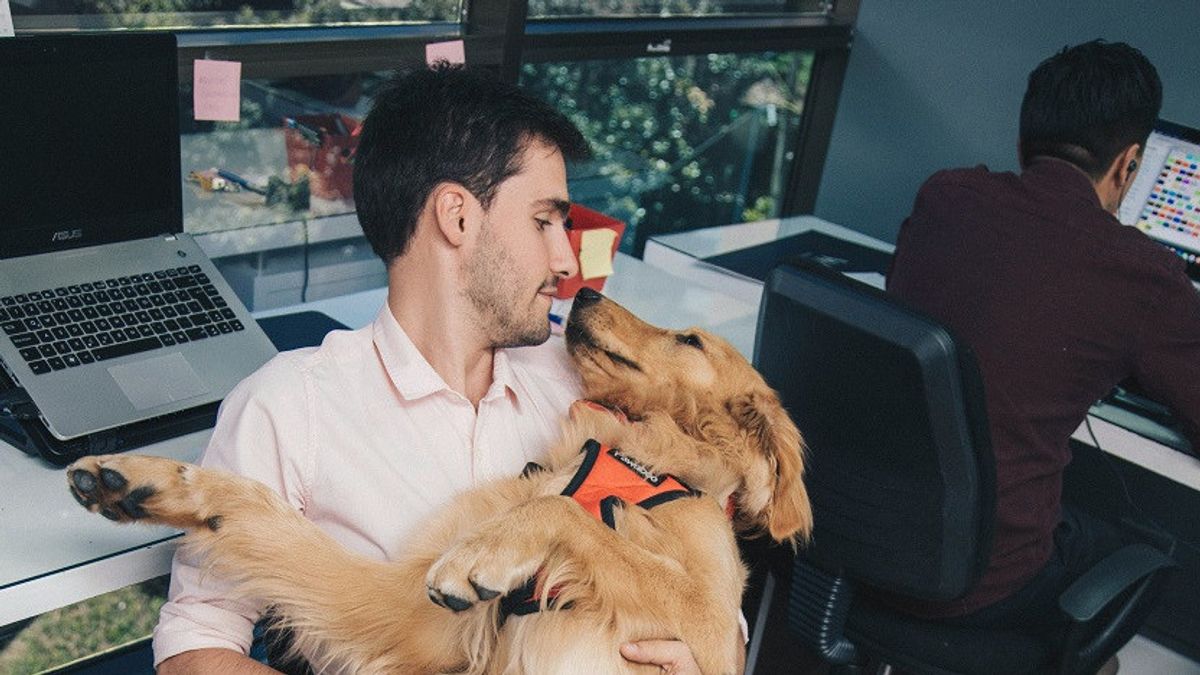JAKARTA - Daisy greets office visitors by wagging her tail. Online, he is listed as the "chief moral officer" of design firm Tungsten Collaborative based in Ottawa, Canada and is among many pets joining their owners returning to Canadian offices after working from home during the pandemic.
A 12 year old golden Labrador is sniffing around the workplace for a treat or something to play with. Next to her, a Basset Hound with long, drooping ears named Delilah calls for attention.
Daisy appears with staff members on the industrial design studio website, where her biography boasts of her skills in "stress management" and "client engagement", noting many of the "industrial design studio's greatest innovations can be traced back to a long journey" with her.
Tungsten Collaborative, which employs about 10 people in the Canadian capital, also hosts Daisy's four-legged companion, Eevee the Greyhound and the barking German Shepherd Hudson.

"We encourage people if they have pets to take them (to work)," Tungsten president Bill Dicke told AFP.
"You develop this relationship at home with your pet every day and all of a sudden you're back at work, so now they have to be put in a crate for the day or roam the house alone, it's not fair to them," she said.
"Tolerance to pets (at work) during the pandemic is increasing," he added.
There are rows of water bowls in the office kitchen, in case the dogs are thirsty. Throughout the day, they sleep under tables, chase balls down the hall or chew on squeaky toys.
Having an Ottawa company registered by the Humane Society as dog-friendly has helped increase business and increase staff productivity, Dicke said.
The workers were forced to take regular breaks to walk the dogs instead of having lunch at their desks, not having to worry about their pets being left alone at home, he explained.

According to a recent Leger survey for PetSafe, more than half of Canadians support bringing a dog into the office.
The idea is very popular with young people, with 18 percent of those aged 18 to 24 saying they would change jobs if their employer refused to allow their pets to come to work.
With some 200,000 Canadians adopting a dog or cat since the start of the COVID-19 pandemic, bosses asking their employees to return to work may have to consider the option.
Meanwhile, Johan Van Hulle, 29, joined Tungsten last year. Rules about dogs, he says, "were an important part of the decision" to take the job.
"Allowing dogs is a good indicator" of company culture, said dog owner Eevee the Greyhound, adding he was looking for a "less corporate" workplace.

Also in Ottawa, at the construction joint venture Chandos Bird, the people who designed the nuclear research lab seem to fall in love with 10-year-old Samson.
Owner Trevor Watt doesn't want to leave the Yorkshire Terrier alone, having moved into a new home and returned to work in January.
It should be a temporary setting. But Samson has not only adapted to office life, he has also endeared himself to colleagues and staff in neighboring offices, who now take turns keeping him company.
"He loves going to work," said Watt, who also enjoys it: "I don't have to worry about him".
Stroking him is a great way to "decompress after a tough encounter," says Watt's boss Byron Williams.
However, dogs in the workplace, however, can also create challenges, especially for those who are afraid of dogs or are allergic to them.
Samson remains bonded when one of Watt's colleagues, who has a phobia of dogs, is around. In another office, workers surveyed by AFP complained of stains on the carpet, annoying barking and pet hair that seemed to be everywhere.
The English, Chinese, Japanese, Arabic, and French versions are automatically generated by the AI. So there may still be inaccuracies in translating, please always see Indonesian as our main language. (system supported by DigitalSiber.id)








